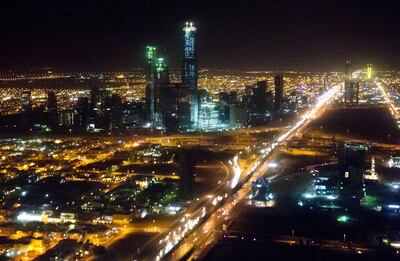Saudi Arabia issued 123 new industrial licences in March, with investments in new permits reaching 3.9 billion Saudi riyals ($1.04 billion), the government has said.
It has pushed the number of industrial licences issued in the kingdom, the Arab world's biggest economy, to 332, state-run news agency SPA said on Sunday, citing Ministry of Industry and Mineral Resources data.
Nineteen were issued for the food manufacturing sector in March, followed by 15 for rubber and plastic products, 14 for metalworking industry — excluding the equipment and machinery segment — 12 for non-metallic mineral products and 11 for chemical materials, the data showed.
Saudi Arabia, the Arab world’s largest economy and world's biggest exporter of oil, is diversifying its economy away from hydrocarbons and has introduced several projects under its Vision 2030, to develop its industrial and mining base.
In October, the Saudi government unveiled a National Industry Strategy, aimed at increasing the value of the kingdom's industrial exports to about $149 billion by 2030.
It is designed to attract investment in the industrial sector, boost economic diversification and increase non-oil exports.
The programme has identified 800 investment opportunities worth $266.2 billion to provide sustainable economic returns for the kingdom by 2030, authorities have said.
Saudi Arabia’s industrial sector created 10,500 new jobs in March, of which 7,255 went to citizens, according to the SPA report.
Small businesses accounted for almost 87 per cent of new industrial licences, while medium-sized enterprises acquired the remaining percentage of permits, the ministry said.
Overall, domestic industrial units accounted for 73.17 per cent of all permits issued, followed by foreign establishments and joint investment companies that received 15.45 per cent and 11.38 per cent, respectively.
The new industrial licences were distributed to 12 administrative regions, led by Riyadh with 46 factories, followed by the Eastern Province and Makkah, at 29 and 18 industrial units, respectively.
In March, the number of existing factories in the kingdom and those under construction stood at 10,825, amounting to 1.4 trillion riyals of investments, SPA said, citing the data compiled by the ministry's National Centre for Industrial and Mining Information.

Of these, 56 factories started production in March with an investment of 959 million riyals. National factories accounted for 94.6 per cent of that, followed by joint venture plants and foreign-owned factories accounting for 3.57 per cent and 1.79 per cent, respectively.
Non-metallic mineral factories took the lead with 15, followed by eight shaped-metal plants and seven food and chemical factories each.
Machinery and equipment factories rounded out the list with five new units.
Separately, the kingdom’s Industrial Production Index for March increased by 4.1 per cent annually, according to the General Authority for Statistics.
This was attributed to an increase in mining, quarrying, manufacturing, and electricity and gas supply activity.


